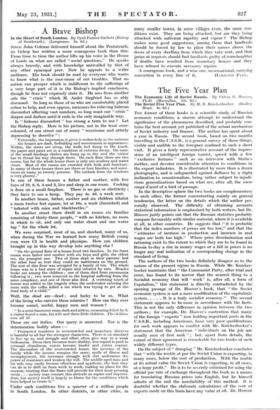A Brave Bishop
SINCE John Colenso delivered himself about the Pentateuch, no bishop has written a more courageous book than this.
From time to time the author lifts up his voice in the House of Lords on what are called " social questions.", He speaks always bravely, and with knowledge unrivalled by that of any other episcopal peer. Now he appeals to a wider audience. His book should be read by everyone who wants to know what is the root-cause of our troubles. That no nation can prosper which is indifferent to the sufferings of a very large part of it is the Bishop's implied conclusion, though he does not expressly state it. He sees from another side the " crisis " which M. Andre Siegfried has so ably discussed. So long as those of us who are comfortably placed refuse to help, and even oppose, measures for relieving hideous discomfort affecting vast numbers, so long must our " crisis " deepen and darken until it ends in the only imaginable way.
Is " hideous discomfort " too strong a term to use ? Let the Bishop reply. Here is his picture, not in the least over- coloured, of one street out of many " wearisome and utterly depressing to describe " :
" Externally, the impression it gives is melancholy in the extreme . . . the houses are dark, forbidding and monotonous in appearance. Within, the stairs are steep, the walls feel damp to the touch, the paper and paint are in a condition of extreme decay. On some of the small landings clothes are hung up to dry and the visitor has to thrust his way through them. On each floor there are two rooms, but for the whole house there is only one scullery and water closet. Most of the rooms are crowded with beds and furniture. In many of these houses there are three or four families, and some- times as many as twenty persons. The outlook from the windows is very gloomy."
In one of these houses a father and mother, with five boys of 10, 8, 8, 4 and 2, live and sleep in one room. Cooking is done on a small fireplace. There is no gas or electricity ; they have to use a lamp. They pay 4s. 4d. a week rent.
In another house, father, mother and six children inhabit a room twelve feet square, let-at 16s. a week (furnished) and
" infested with mice and blackbeetles."
In another street there dwell in six rooms six families consisting of thirty-three people, " with no kitchen, no room in which to sit, and only one water closet and one water tap " for the whole lot. . . .
We were surprised, most of us, and shocked, many of us, when during the War we learned how many British young men were C3 in health and physique. How can children brought up in this way develop into anything else ?
" On the ground floor of a house lived two families. In the front rooms were father and mother with six boys and girls, the eldest ten, the youngest one. Two of these slept in their parents' bed the other four as best they could- on mattresses -on the ground. The rest of this floor was occupied by a family of- ten. The _whole house was in a bad state of repair_ and infested by rats. Measles broke out among the children ; one of- them died from pneumonia following it;- two were removed to the hospital suffering from the same complaint, and one of. these also died. A crowning touch of horror was added to the tragedy, when the undertaker entering the room with the coffin killed a rat which was trying to get at the dead body of a child:"
Well, the dead are—dead ; and lucky to be so. What of the living who survive these miseries ? How can they ever become sound, useful, happy men and women ?
" In a semi-basement room dark and airless, measuring 8 feet by 8, a visitor found a man, his wife and three little children. The children were all ill.
Those are our italics. Our query is answered. Nor is the deterioration bodily alone
Protracted residence in overcrowded and insanitary districts is harmful to all but the strongest characters. There is no standard to live rip to, and struggle and effort often give way to a weak listlessmiss. Dress then becomes more shabby, less regard is paid to personal cleanliness," voices become louder and voices coarser. The discomfort of the overcrowded house, the increase of the family while the income remains the same, spells of illness and unemployment, the incessant struggle with dirt undermine the power of resistance and weaken the will. The middle-aged man and his wife may easily become effortless and apathetic, the best they can do is to drift on from week to week, making no plans for the morrow, trusting that the State will provide for their most pressing needs . . . society may censure this attitude as supine and improvi- dent, but society itself is largely to blame for the conditions which have helped to create it." • -
Under such conditions live a quarter of a million people in South London. In other districts, in other cities, in
many smaller towns, in some villages even, the same eon• ditions exist. They are being attacked, but are they being attacked with sufficient rapidity and vigour ? The Bishop makes some good suggestions, among them that landlords should be forced by law to place their names above the doors of every dwelling from which they take rent, and that juries at inquests should find landlords guilty of manslaughter if deaths have resulted from insanitary houses and they have refused to execute necessary repairs.
A courageous book, and a wise one, unsensational, carrying conviction in every line of it. HAMILTON FYFE.






































 Previous page
Previous page